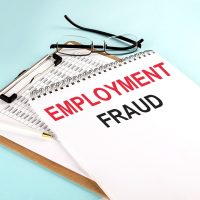How to Prove Wage Fraud and Violations in CA

California employers are required by law to pay employees fairly. Employers have many obligations, including paying employees a minimum wage, paying extra for overtime work, giving employees meal and rest breaks (or paying the relevant penalty), and paying employees for the hours of work performed. If an employer tries to skirt their responsibilities and underpay their employees, they could be guilty of wage fraud or other wage & hour violations. Wage theft not only opens up an employer to civil liability; it’s chargeable as a criminal offense. Read on for advice on how to prove your employer is committing wage fraud and other labor law violations. Call a dedicated California labor & employment attorney with any questions or for help with an employment-related matter.
Common Forms of Wage Fraud
Wage theft is a form of fraud. Wage theft or wage fraud occurs whenever an employer fails to pay employees in accordance with the law. Employers may try to short-change employees and, in doing so, commit wage fraud, through various unscrupulous means. Common forms of unlawful wage & hour conduct include:
- Paying below a minimum wage
- Failing to pay wages for hours worked
- Forcing employers to work after clocking out, or to work during meal and rest breaks
- Coercing employees into under-reporting their hours (e.g., by clocking out early)
- Failing to pay overtime
- Meal and rest break violations
- Taking workers’ tips
- Failing to pay commissions
- Unlawful deductions from a paycheck (such as deductions for the company uniform or equipment)
- Unpaid vacation wages
- Refusing to reimburse business expenses
- Failing to pay final wages upon termination of an employee
If you suspect your employer is committing wage fraud, it’s important to act. Discuss the matter with a labor law attorney and start building your case as soon as possible. Waiting too long to act can render it much more difficult to prove your case down the line. Evidence has a way of disappearing over time, and having the right evidence is key in proving your wage fraud claims.
Collecting Evidence for a Wage Fraud Case
To bring a wage fraud or other wage & hour claim, you need to collect the right evidence. You’ll need evidence whether you are filing a claim with the California Division of Labor Standards Enforcement (DLSE), filing a claim with a federal agency under the Fair Labor Standards Act (FLSA), filing a civil lawsuit, or aiding in criminal prosecution.
To support your claim, you’ll need the right kind of evidence. Useful evidence will differ depending upon the specific nature of your claim, but in general you’ll need documents proving the hours you actually worked, the pay to which you are entitled, the pay you actually received (and the pay you didn’t), and other evidence showing unlawful or unscrupulous conduct by your employer.
Evidence you’ll want to collect to support your wage fraud claim might include:
- Time records demonstrating the hours you worked and for which you were not paid
- Time records showing unusual patterns–such as being clocked out before normal business hours are up
- Your employment agreement dictating the compensation you should be receiving, including wages, commissions, bonuses, overtime, and vacations
- Pay stubs showing you the wages you were paid before the unlawful conduct began and during the period of unlawful conduct
- Dishonored paychecks
- Communications (texts, emails, memos, voicemails, etc.) with your employer regarding missing payments or other related issues
- Communications from your employer showing unusual mandates or conduct, such as asking employees to avoid reporting overtime, under-report hours to clients or on their timesheets, clock out early or perform tasks after clocking out
- Communications from your employer with any threats of retaliation, such as threats of termination, demotion, or regarding immigration status and consequences
It’s helpful to keep the originals, where possible, and provide copies to your attorney or the relevant state or federal agency. Ultimately, you and your attorney may need to request copies of these documents from your employer as part of your claim. Talk to your labor law attorney about your concerns to learn how you can start building your wage fraud case today.
If you are a San Francisco employee or employer in need of advice or representation concerning wage fraud, wage & hour violations, non-compete agreements, retaliation, whistleblower protections, workplace discrimination, or other California labor law issues, contact the Bay Area employment law attorneys Richard Koss and Rand L. Stephens at 650-722-7046 on the San Francisco Peninsula, or 925-757-1700 in the East Bay.